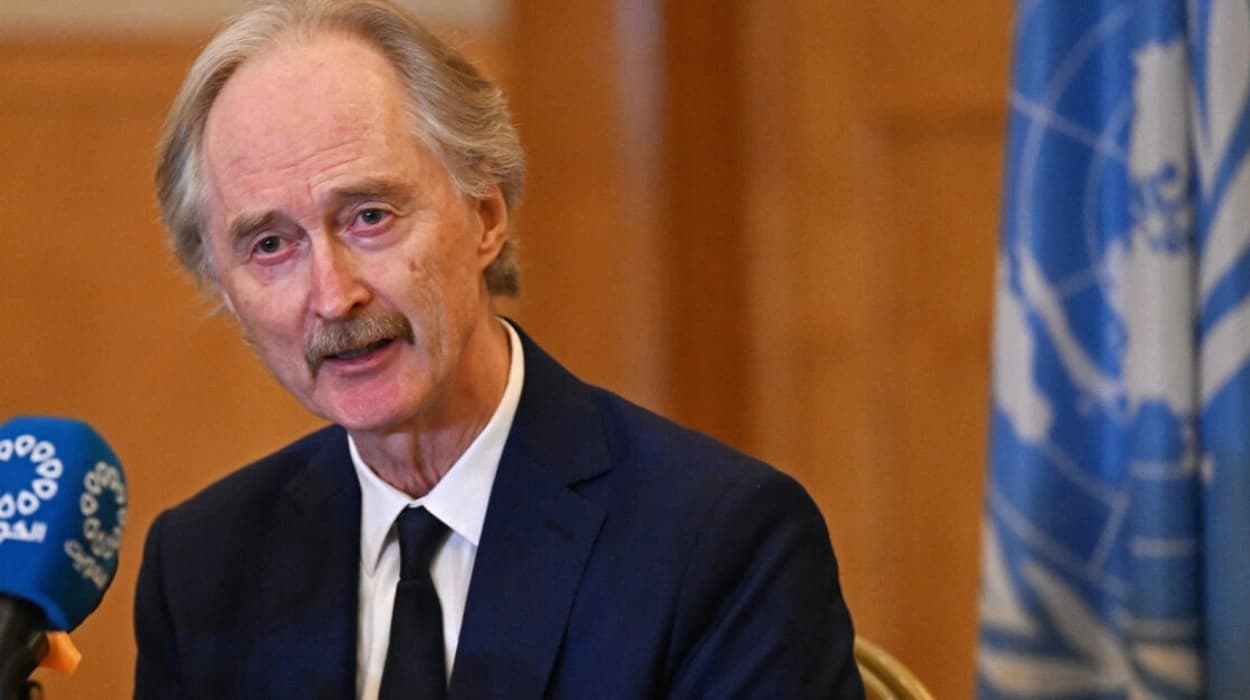Geir Pedersen announced his resignation as the United
Nations Special Envoy for Syria after serving six years, citing the complex and
protracted nature of the conflict. His departure comes amid ongoing challenges
in advancing peace talks and engaging conflicting parties in Syria’s
multifaceted war.
Breaking News: UN Syria Envoy Geir Pedersen to Resign
The United Nations Special Envoy for Syria, Geir Pedersen,
has confirmed his decision to step down after six years navigating one of the
world’s most intractable conflicts. His resignation marks the end of a
significant chapter in international efforts to mediate peace in Syria.
Persistent Challenges Amid Protracted Conflict
As reported by Reuters journalist Artemis Moshtaghian,
Pedersen’s tenure has been marked by persistent deadlock and fragmentation
among Syrian factions and their international backers. The Syrian civil war,
entering its 14th year, continues to defy diplomatic resolution despite UN-led
peace initiatives.
His role required balancing delicate negotiations involving
the Syrian government, the opposition, and various external actors including
Russia, Iran, Turkey, and Western countries. The envoy's stepping down underscores
the daunting obstacles in uniting these divergent interests around a political
settlement.
Pedersen’s Tenure and Diplomatic Efforts
Geir Pedersen, a seasoned Norwegian diplomat and former UN
Assistant Secretary-General for Political Affairs, took office in October 2018.
Appointed by then-UN Secretary-General António Guterres, Pedersen succeeded
Staffan de Mistura with a mandate to facilitate the Geneva peace talks and
implement UN Security Council resolutions, including Resolution 2254 aimed at a
Syrian-led political process.
The Associated Press correspondent Oliver Holmes notes that
during his six years, Pedersen convened multiple rounds of talks among Syrian
stakeholders but faced numerous setbacks largely due to the conflicting demands
of Assad’s regime and opposition groups. Despite limited progress, Pedersen
remained a constant presence advocating for dialogue and humanitarian access.
Statements from UN and International Officials
In a statement provided to the UN News Service, UN spokesperson Stéphane Dujarric conveyed gratitude for Pedersen’s dedication.
“We acknowledge Mr Pedersen’s tireless efforts in advancing the peace process under exceptionally difficult circumstances and his commitment to the Syrian people,” Dujarric said.
United Nations Secretary-General António Guterres praised Pedersen’s unwavering commitment to diplomacy.
"His expertise and perseverance have been invaluable, even as the road to peace remains arduous," Guterres affirmed.
Reactions from Regional and Global Stakeholders
Regional powers involved in Syria—Turkey, Russia, and
Iran—have yet to publicly comment on the resignation. However, political
analysts cited by Al Jazeera suggest that Pedersen's departure may create a
temporary diplomatic vacuum, raising questions about continuity of peace
efforts.
Western governments, including the United States and
European Union, acknowledged Pedersen’s contribution. A spokesperson for the US
State Department told Voice of America that the envoy’s departure underscores
the importance of renewed engagement to resolve the conflict.
The Road Ahead for Syria Peace Process
With Pedersen stepping down, the United Nations is expected
to initiate a search for his successor promptly to maintain momentum. The
envoy’s successor will confront the same complex challenges: sustaining
dialogue amid a shattered political landscape and coordinating humanitarian
support in an ongoing crisis that has displaced millions.
As stated by The Guardian's correspondent Emma
Graham-Harrison, the peace process remains fragile. While some ceasefires have
held, the broader political settlement envisioned by the UN remains elusive,
amid ongoing violence and stark geopolitical rivalries.
Background: Syria Conflict Overview
The Syrian conflict began in 2011 amid popular uprisings
demanding democratic reforms, quickly escalating into a full-scale civil war
involving multiple armed factions and foreign powers. Over 500,000 people have
died, and millions have been displaced internally and globally.
The UN’s Syria peace efforts have included negotiations in
Geneva, Astana, and other venues, aiming to establish a transitional governing
body, constitutional reforms, and humanitarian access. However, entrenched
distrust and competing agendas have slowed progress.
Pedersen’s Legacy and the Challenge Ahead
Geir Pedersen’s resignation after six years underscores the formidable complexities in ending Syria’s war. His tenure symbolises both the perseverance and the limitations faced by international diplomacy in conflict resolution. The United Nations’ next steps will be critical in determining whether fresh leadership can break the longstanding stalemate and pave the way toward peace.
